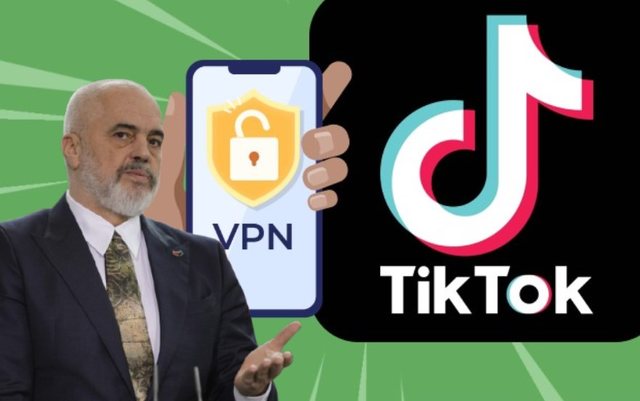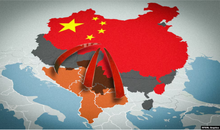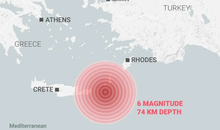
 Flash News
Flash News
9 months after taking office, the Chief of the Guard, Ermal Onuzi, resigns
He breaks arrest, steals a car and escapes like in a movie, the serial thief from Tirana is caught!
Name/ She deceived clients and took their money, the lawyer is wanted
Criminal group busted, trafficking dogs from Spain to Finland, the 'heads' of the group were Albanians
She escaped drowning in Durres, the 31-year-old English woman speaks: We capsized instantly, my friend was trapped under the vehicle
The VPN Era in Albania/ How the TikTok ban is "failing", video views are increasing

On March 13, 2025, the Albanian government imposed a one-year ban on access to TikTok, citing concerns over cybersecurity and the negative impact of harmful content on young people.
However, this ban has proven to be ineffective, as Albanian users have found ways to bypass it, mainly through the use of virtual private networks (VPNs).
Despite efforts to block the platform, TikTok remains extremely popular in Albania. According to data from parent company ByteDance, at the end of 2024, the app had 1.53 million users over the age of 18 in a country with a population of 2.4 million.
Recent analysis shows that the ban has had minimal impact on platform usage. According to a report by Pikasa Analytics, only a 3.3% drop in posts was observed after the ban, while video views increased by 14% compared to the week before the ban.
After the TikTok ban, VPN usage in Albania has seen a tremendous increase. According to ProtonVPN, usage of their service increased by 1200% on the first day of the ban, and this trend continues to grow. Currently in Albania, on the Appstore, VPNs are the third most downloaded app of the last month, after ChatGPT and Temu.
Keishliii, one of the most popular TikTok influencers in Albania, has maintained a steady presence on the platform. With over 134,000 followers and an engagement rate of 5.80%, she continues to attract a wide audience. Her posts average 101,200 views and 4,700 likes, indicating continued interest from her followers despite the ban.
Another popular content creator is Hatixhe Brika, known as Hati, who has seen her following increase by 30% since the beginning of the year. She currently has 512.5 thousand followers and has a total of 32 million likes since starting to use the platform.
But what does this show?
According to technology expert Tomi Kallanxhi, the ban on TikTok in Albania has shown that in the digital age, efforts to limit access to popular platforms can be ineffective and bring unforeseen consequences.
“The increase in the use of VPNs and the continued use of TikTok suggest that citizens are willing to find ways to circumvent restrictions,” he says.
Kallanxhi points out that for many users, the ban became an incentive to learn new technologies. “There are cases when users, looking for ways to restore access to TikTok, learned to use VPNs, change network settings or install other protective applications. This in itself is a form of digital education.”
According to him, TikTok's success is due to the fact that the platform's algorithm is extremely engaging and manages to understand and serve content according to each user's preferences in an almost perfect way. This is why TikTok is increasingly replacing YouTube for Generation Z.
“Today, about 67% of young people of this age in Albania use TikTok more than YouTube,” Kallanxhi notes.
“I don’t see this phenomenon as a concern, but as an advantage,” he adds. “It’s an opportunity to understand where the attention of the younger generation goes and how it can be channeled towards quality content, rather than struggling with technical bans that don’t work.”
Why does TikTok remain so popular?
The answer is simple: TikTok is not just an app for short videos. It has become a platform for entertainment, information, commerce, and even activism. Its personalized algorithm, speed in spreading content, and ability to reach wide audiences make it a powerful tool.
In Albania, TikTok has become an important window for influencers, artists, small businesses and the political opposition. The latter has publicly expressed dissatisfaction with the decision, calling it a politically motivated act to limit voices against the government, especially in the run-up to elections./ MONITOR
Latest news




Baçi: Rama was afraid of popular discontent, stole more votes than he thought
2025-06-03 22:10:14




9 months after taking office, the Chief of the Guard, Ermal Onuzi, resigns
2025-06-03 20:14:09

15-year-old injured by gunfire at 'Ali Demi' pizzeria, police arrest perpetrator
2025-06-03 19:32:04

Why don't I want to spend a single day in Vlora?!
2025-06-03 18:26:21
Tech-stinction alert: Will humanity shrink to just 100 million people?
2025-06-03 18:02:23
EPP accepts Berisha's request: A fact-finding mission will be sent to Albania
2025-06-03 17:49:47
Three vehicles collide in Elbasan, several injured suspected
2025-06-03 17:45:02
Prosecutor Marsida Frashëri faces a request for dismissal at the KPA
2025-06-03 17:21:57
Nga Holanda në Finlandë, si operonte rrjeti shqiptar i drogës
2025-06-03 17:10:34

Tusk kërkon votëbesim në parlamentin polak më 11 qershor
2025-06-03 16:59:01






EUROPOL: Minors increasingly targeted by terrorist propaganda
2025-06-03 15:04:56
Kindergarten in Gramsh reopens where children were poisoned with salmonella
2025-06-03 14:59:16

OECD: Global economy heading for weakest growth since Covid-19
2025-06-03 14:35:26
A farm in Postribë, Shkodra, is quarantined, small livestock infected,
2025-06-03 14:21:50

74-year-old from Kamza, the oldest high school graduate in the English exam
2025-06-03 13:59:30
The average salary in Kosovo reached 639 euros in 2024
2025-06-03 13:49:00
Osmani invites parties to consult on the date of local elections
2025-06-03 13:41:33
Name/ She deceived clients and took their money, the lawyer is wanted
2025-06-03 13:25:24

He hit and killed a 59-year-old man and fled, the young man is wanted
2025-06-03 12:58:29

Two cars collide in Bulqiza, drivers injured
2025-06-03 12:34:46


15 people arrested for cyber fraud and misuse of bank cards in Gjilan
2025-06-03 12:02:41
Greece and Turkey hit by earthquake
2025-06-03 11:49:08
Due to lack of lawyers/ The hearing for the 'Golden Bullet' is postponed again
2025-06-03 11:36:52

More than half of foreigners in Serbia are Russians
2025-06-03 11:15:59

Scandal repeats, English exam thesis leaked
2025-06-03 10:46:54


They printed fake logos of well-known brands, 4 arrested, two others wanted
2025-06-03 09:42:58
A verbal agreement by Rama prompted the contested interventions in Spaç
2025-06-03 09:23:32


Horoscope, what do the stars have in store for you today?
2025-06-03 08:34:30

Temperatures up to 31 degrees Celsius, weather forecast for this Tuesday
2025-06-03 08:09:06
Morning Post/ In 2 lines: What mattered yesterday in Albania
2025-06-03 07:51:10



Convinced DP candidate: Tirana district is opening, MPs' order changes
2025-06-02 21:42:53


Cara: At the head of the state is a party that was not voted for by Albanians
2025-06-02 21:16:53
The constitution of the Kosovo Assembly fails for the 25th time
2025-06-02 21:10:46
"130 thousand unused ballots", CEC responds to the DP
2025-06-02 20:51:02
Italian professor who insulted Giorgia Meloni's daughter attempts suicide
2025-06-02 20:25:21
Fire breaks out in a building in Astir
2025-06-02 20:22:46




Two women threaten the Saranda prosecutor in her office
2025-06-02 19:09:20
Etna wakes up again, the most active volcano in Europe erupts
2025-06-02 19:00:36







Fire reactivates in Darëzeza forest, firefighting efforts impossible
2025-06-02 17:28:29

Cultivating cannabis on a plot, 35-year-old arrested in Mirdita
2025-06-02 16:59:27

Switzerland/ Albanian caught with drugs worth over 1 million euros
2025-06-02 16:50:38
Kosovo-Serbia dialogue meetings resume in Brussels
2025-06-02 16:32:44
The VPN Era in Albania: How the TikTok Ban is "Failing", Video Views Increase
2025-06-02 16:26:36
Mahmut Orhan brings a unique experience with Curious X
2025-06-02 16:19:55

Businesses "forgot" to pay for elections, liabilities reached 4.7 billion lek
2025-06-02 15:50:27
Photo/ Caught with cocaine, Albanian arrested in Britain
2025-06-02 15:31:12


He violently opposed police officers, 39-year-old arrested in Vlora
2025-06-02 15:04:28


